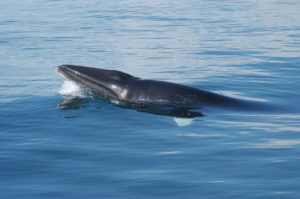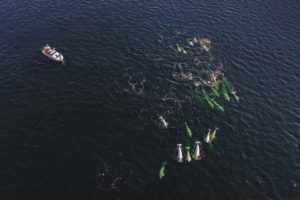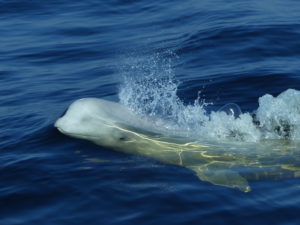The blog post was provided by Group for Research and Education on Marine Mammals (GREMM).
This blog has been translated from French.
If you have ever seen a whale, dolphin, or beluga, you know the power of such a meeting. These gigantic mammals lead a mysterious life that takes place far from our eyes, in the depths of the St. Lawrence river or the oceans. Yet their lives are intertwined with ours. As head of communications for the Group for Research and Education on Marine Mammals, I see this every day.

Here, as well as in all the oceans of the planet, we have weakened the populations of whale species. We can already feel the impact of intensive commercial hunting of the past, chemical contamination, noise pollution, overfishing, and climate change. Even someone living on the land in Manitoba has an impact on whales! Everything we consume that arrives by boat passes through the whales’ home. The fertilizers that we put on our lawns and in our fields trickle down into their environment. Fortunately, our growing knowledge of the threats to whales makes it possible to find and adapt effective solutions.
All Together Towards Solutions
For thirty-five years, the Group for Research and Education on Marine Mammals (GREMM) has dedicated “whale-sized” efforts to developing research programs as well as educational and popularization tools that will aid in the conservation of the whales of the St. Lawrence river. We spend hundreds of hours at sea every summer, with beluga whales, harbor porpoises, blue whales, fin whales, humpback whales, minke whales. During these privileged meetings, we have learned to recognize them individually. Over the years, we have put together true family albums, retracing the history of the hundreds of whales we have come to know. Our research projects are based on this patient, long-term, meticulous approach. Our educational programs tell these stories, those of Neo, Tic Tac Toe, Zipper.

The results of our work, often carried out in collaboration with other experts from non-profit organizations, universities or public bodies, have provided a solid scientific basis for the establishment of marine protected areas and the development of regulations aimed at improving our cohabitation with whales. We coordinate the Quebec Marine Mammal Emergency Response Network to help whales in difficulty and prevent incidents. We are helping to train master’s and doctoral students, who will continue our work with whales for generations to come.
In our Interpretation Centre on Marine Mammals (CIMM), we share a piece of our passion. On the web, through Whales Online, we share whale sightings, we popularize the knowledge acquired, and we answer questions from the public. By all these means, GREMM strives to make as many people as possible love whales so that together we can protect them.
Complex Animals, Varied Actions
Whales have a longevity comparable to ours. Efforts to protect them must therefore be long-term.
Each species has a complex social life. Killer whales stay with their mothers all their lives. Male and female North Atlantic minke whales do not mix during the summer. Belugas have several networks of relationships. We must take the whale society into account in our actions to adjust conservation measures.

There are more and more of us on this planet. Living with whales, but also with all the wildlife that populates our oceans, represents a great challenge. It is often said that whales are an “umbrella” species. By protecting them, we are improving the environment for thousands of other species. And among these species we are protecting, are humans.
The survival of whales is tied to the value we place on them today. Getting to know them, entering their fascinating world and sharing this knowledge are the best guarantees for their future. For our future.
To celebrate CanadaHelps’ 20th anniversary, GREMM took part in a video series to highlight how charities touch all of our lives, every day. Watch how GREMM is making a big impact in our film below. And watch the rest of the video series on our website.
Leave a Reply